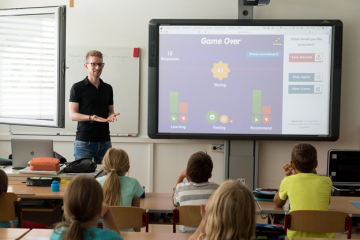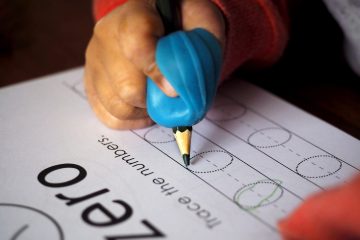Developing reading and writing skills is essential in children as it lets them learn and expand their knowledge base at an early age. Most parents find it a challenge to develop this habit in children – follow this guide to understand how to make reading and writing fun for your kids.

Make It Positive and Playful
The first and foremost tip to get your children to read and write is to make it fun and interesting! If you try to force reading on kids, they will think of it as a mandatory task, and it’s highly likely they will start avoiding it like the plague. Try to make it a fun activity for the kids, so they can’t wait for that time of the day where they get to read and write.
Kids love to play, which is why you need to include reading and writing habits in their playtime. You can also begin by reading them bedtime stories, so they start enjoying listening to stories. Eventually you can encourage them to read to you as they get older, or take turns reading.
You can also motivate kids by telling them they will be the smartest kids if they read books and write anything they want to. Remember to be encouraging to your little ones so they don’t feel it is a chore!
Curiosity
Children love to find out what happens next. If you make them curious about storytime, they will likely be interested in reading what happens next. Curiosity is the one thing that makes it difficult for anyone to leave books!

Reward Reading
Engage your kids in reading by offering a reward once they finish reading a book (e.g. you will watch the movie together). A reward is a proven way to motivate children. Once the child ends the book, you can then watch a movie of the same book so the child is encouraged to read more books to watch the movies. You can also add fun activities that go with the book, like cooking a meal from the book or doing a special craft. You can ask them if they preferred the book or the movie, which character they loved the most in the movie and book, etc.
Let Them Read What They Want
Taking your children to the library or bookstore is another fun family activity that can deepen their love for reading. Let them decide which book they want to read. This activity can be very motivating for children when they know they get to choose their next book. If a child is reading what you want them to read, most likely they will lose interest quickly; however, a book of their own choice will keep them motivated to read it.
Journaling
Journaling can be fun and encourages kids to write about what they love and enjoy. Depending on their interests, you can encourage them to make their own journal, a photo journal where they document their vacations, or one where they make art and then describe it.
Help them decorate the journal and give them ideas to get started. For example, get them a few photos from your vacation and recommend they write about what they enjoyed, the food they ate, the room they stayed in, etc. You can also make a superhero journal if it interests your child. In this way, your children will enjoy the activity and eventually develop a habit of writing.
Stationery
Another effective way to make writing fun for kids is by getting them colorful pencils, markers, and watercolors. Children love to play around and giving them an option of colorful pencils and colors will help motivate them to write. Moreover, for reading, you can get them a bookmark with a design they would love. You can also DIY bookmarks with your kids, so they develop an interest in reading books and keeping bookmarks.
Lead by Example
We all know that children emulate the adults in their life – your child is going to have the habits that you have. If you are glued to your screens all day long, that’s what your kids will want to do as well. Therefore, develop a habit of reading and writing to help your children follow suit. If they see you reading, they are more likely to read as well. Set a dedicated time of the day for reading and writing; you can ask your kids to join you for independent reading time.
Teach your children how to love books and keep them safe from an early age. Make a dedicated space like a bookshelf or special book box where you can keep all the books safe. If you show that you love books in front of your kids, they will learn to value them and keep them safe as well.
Dedicated Reading Space
If you have enough space at home, try to make a reading corner for your kids. Focus on the ambiance and make it cozy for them, so they enjoy the whole mood. Children love to have fun with make-believe things, so try out a tent or a fort made of pillows and sheets with cute lights. The feeling of having a fun space for reading or writing will motivate them to have their reading time every day, and eventually they might start seeking out the space and reading more often.
Story Charades
Another way to make reading fun is by playing story charades as a family. Story charades is like regular charades, but you only have to guess books. Games like these will encourage your children to read and play so they can also act, guess, and become involved in a fun activity. You can encourage them by giving different roles to play. You can even get costumes so they can role play while playing games after reading books.
Genres
Introduce your children to different genres of books so they can figure out what they enjoy reading. Comics, fiction, real-life stories, thrillers, horror, or drama – give an age-appropriate sample of each genre to your child and let them figure out what they love most. Reading different kinds of books helps kids enjoy the reading process. Once your child has developed a habit of reading, you can even introduce some academic or skill-based material, such as how-to guides for a craft/hobby, computer coding or web design basics. Assist them with selections and help make reading a fun activity for your children.
Arslan Hassan is an electrical engineer with a passion for writing, designing, and anything tech-related. His educational background in the technical field has given him the edge to write on many topics. He occasionally writes blog articles for Dynamologic Solutions.


